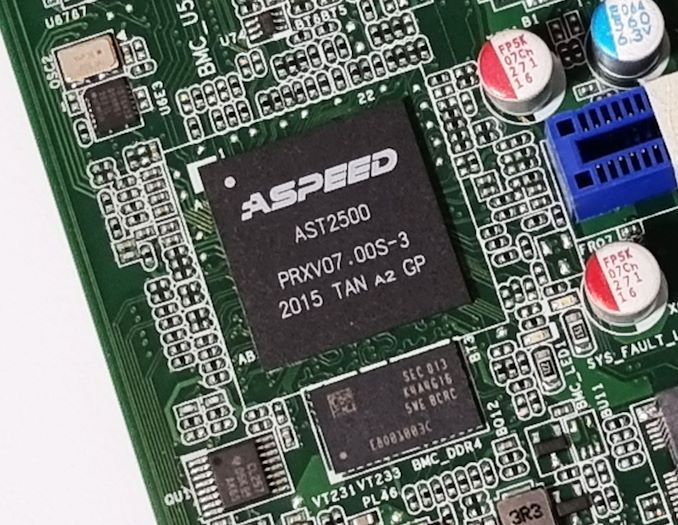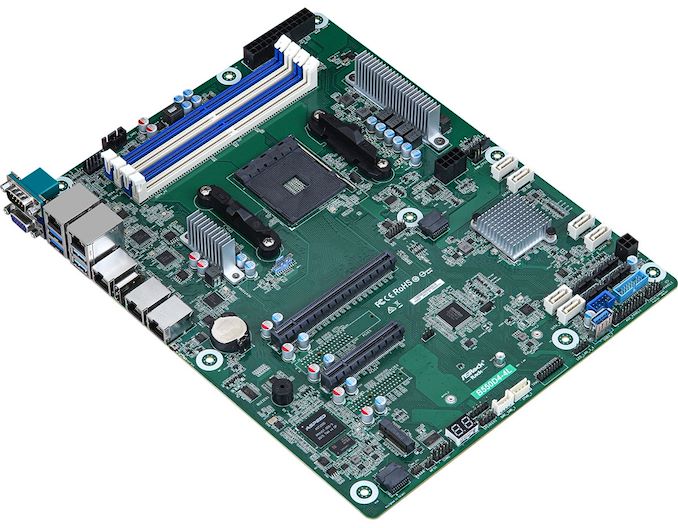ASRock Rack B550D4-4L Motherboard Review: B550 Goes Professional with BMC
by Gavin Bonshor on May 20, 2021 9:00 AM ESTConclusion
Not every motherboard is created equally, nor is every motherboard created with the same functionality as other models. Typically as seen on Intel platforms, it has its consumer-level chipsets such as B560, Z590, Z490, etc, but it also has a level pegged W480 chipset for professional users, which falls outside of its typical industrial level Xeon Scalable platform. Looking at AMD, it doesn't really do this with its desktop platforms, and users looking for workstation-level performance with consumer-level functionality can opt for Threadripper. The other options include Ryzen for desktop, and EPYC for enterprise, cloud, and server, with no real in-between.
When we first got wind of the ASRock Rack B550D4-4L back in January, it piqued our interest as it's the only known board to us that uses AMD's B550 desktop chipset to feature a BMC controller, in this case, an ASPEED AST2500, which is commonly used on professional level boards such as this. Another unique feature of the B550D4-4L is that it has four Intel Gigabit Ethernet ports on the rear, with a fifth designed to provide users access to the board's IPMI, for remote access purposes.
Being on an AMD Ryzen desktop platform, this allows users to use PCIe 4.0, with one full-length PCIe 4.0 x16 slot, and one half-length PCIe 4.0 x4 slot. Typically B550 boards only have one PCIe 4.0 slot, and this is where the B550D4-4L opts for a second PCIe 4.0 slot over a Gen 4 M.2 slot. Instead, the board has one PCIe 3.0 x4 M.2 slot, which supports SATA. As we know, the B550 chipset itself uses PCIe 3.0 lanes, and ASRock Rack is routing this through AMD's modular chipset and tracing to add the second PCIe 4.0 x4 half-length slot. Other storage options include six SATA ports, with four from the chipset with RAID 0, 1, and 10 support, and two via an ASMedia ASM1061 SATA controller.
Functionality and usability are two key parameters to look for in a server-focused model, and the B550D4-4L provides plenty of this, with an intuitive and accessible IMPI interface. We've highlighted that the ASRock Rack IPMI is functional in previous reviews, and the B550D4-4L is no different in this regard. There is also plenty of functionality within the firmware, with B550 specific options including access to AMD Ryzen's Precision Boost Overdrive settings, as well as an LN2 mode, which seems completely out of tune with the board's core values. We really wouldn't recommend overclocking a Ryzen 3000 or 5000 series desktop processor on this board, primarily due to the design of the 4+2 power delivery, and the inadequate heatsinks designed to cool it.

The ASPEED AST2500 BMC chip on the ASRock Rack B550D4-4L motherboard
Focusing on the performance, and the B550D4-4L was surprisingly competitive when compared to other B550 models, not just in our system testing, but in our computational benchmarks too. It has Precision Boot Overdrive (PBO) applied by default, which allowed our Ryzen 7 3700X processor to stretch its legs a little, especially when cooled with our Corsair H150i Elite Capellix 360 mm AIO cooler. The only negative in performance came in our DPC latency testing, with our results showing that this board isn't suitable for DAW systems. In the firmware, we did try setting the same settings as other B550 models on test, but no matter what we inputted in relation to memory settings, the latencies wouldn't change on our memory and resulted in DDR4-3200 with CL22 latencies; this would have a negative impact on general compute performance, but with DDR4-3200 CL16, we would expect it to be highly competitive with other models we've tested.
Final Thoughts
The ASRock Rack B550D4-4L at the time of writing is in a league of its own, with no other AMD B550 series motherboards offering a BMC controller. Another factor to consider here is we haven't been able to find this model anywhere at retail, and we don't have any official MSRP pricing at this time. This makes it tricky, to sum up as it's hard to recommend a model we can't physically get our hands on globally. We do expect the B550D4-4L to be available at retail at some point, and when it eventually is, it offers an interesting professional-level take on AMD's consumer B550 platform.
It keeps up with other B550 in terms of performance which is surprising, but it also has an excellent IPMI interface for easy access and usability. This makes the B550D4-4L one of the most interesting B550 models we've seen so far, especially with four Gigabit Ethernet ports.











73 Comments
View All Comments
mode_13h - Monday, May 24, 2021 - link
I can understand the sentiment of wanting 10G to take hold, so that prices will come down.Some of ASRock Rack's boards do have an option that includes a 10 Gigabit controller. I've had my eye on the X570D4U-2L2T, in fact.
I think the reason this probably lacks 10 Gigabit is that they have two X570-based boards with 10 Gigabit (and one without). The point of the B550 board is to be lower-priced. So, if someone wants it, they can easily just step up to one of the X570s that has it.
spikebike - Tuesday, December 28, 2021 - link
The article mentions a variant of the B550d4 with 2x10G.fmyhr - Thursday, May 20, 2021 - link
Would many of this board's prospective users really use a GTX 980 and 1200W 75% PSU? Personally if I'm willing to spend that much electricity on a server, I'd go EPYC. The benefit of this board AFAICT is the ability to construct a true Ryzen server (i.e. ECC RAM and OoB management) that uses less power, and may cost less, than EPYC. Tradeoff is far less I/O bandwidth, and lower limit on CPU cores. Anyway, back to point: to lower power use with this you'd want to match power supply to actual requirement, something ~400W, preferably 90+ Gold or better efficiency, is probably a lot more appropriate.Einy0 - Thursday, May 20, 2021 - link
Agreed, I'd much rather see power consumption numbers using just the BMC for video and an appropriately sized power supply.dsplover - Thursday, May 20, 2021 - link
Excellent niche board, perfect for Pro Audio Workstation, as well as a 1U build.Just need the 5700G to get me to jump.
Nice Review
hansmuff - Thursday, May 20, 2021 - link
"The only negative in performance came in our DPC latency testing, with our results showing that this board isn't suitable for DAW systems."dsplover - Thursday, May 20, 2021 - link
DPC Latency is of no concern as I run an external DSP Audio/MIDI Interface.Been using ASRock Rack boards for years, even though they “bench” poorly.
It’s the stability that counts for me. They are pricey but then so am I....
hansmuff - Tuesday, May 25, 2021 - link
Fair enough!edogawaconan - Thursday, May 20, 2021 - link
From the manufacturer's page:"For AMD Ryzen Desktop Processors with Radeon Graphics, ECC support is only with Processors with PRO technologies"
Pretty sure this means only G series of Ryzen don't have ECC support.
fmyhr - Thursday, May 20, 2021 - link
As best I've been able to determine, Ryzen APUs do not support ECC unless they're of the "Pro" variety. Read somewhere this is because the iGPU must also support ECC, and most of them do not. Don't know why AMD makes this info so difficult to find out, OR why they've so far shipped Pro APUs only to OEMs, none to retail. It's like they don't WANT to compete with Xeon E3. </rant>